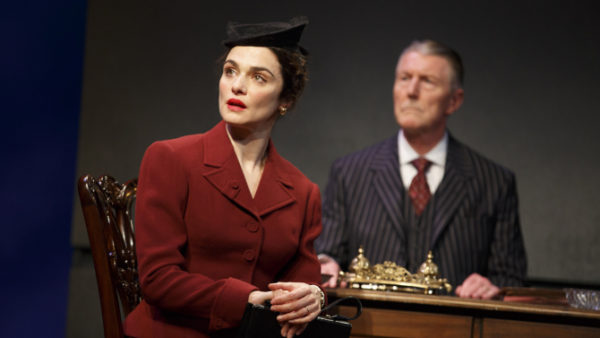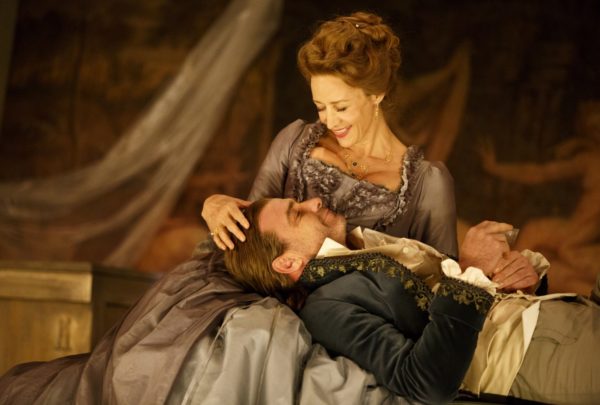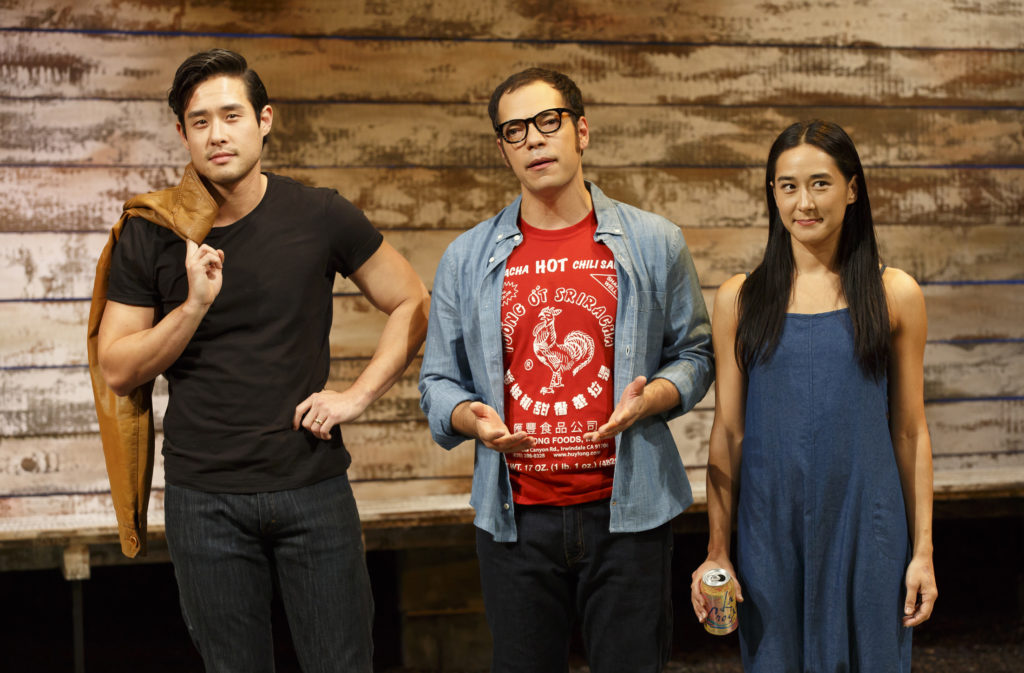[alert type=alert-white ]Please consider making a tax-deductible donation now so we can keep publishing strong creative voices.[/alert]
Two current Off-Broadway productions provide a 70-year historic overview of narcissistic British behavior and the decline of that country from admirable empire to self-absorbed ruin. David Hare’s 1978 Plenty at the Public traces the crack-up of the country from World War II into the 1960s through the scattered and destructive choices of its neurotic but charismatic heroine. Mike Bartlett’s 2010 Love, Love, Love at the Laura Pels in a Roundabout staging, picks up where Plenty leaves off, taking us from the mod Beatles era into the 21st century. This work chronicling the tsunami-like romance of Kenneth and Sandra, a Baby-Boomer Everycouple, who destroy everything and everyone in their path and are meant to represent all of the crimes committed by their heedless generation. Both playwrights are angry at their native land and score stinging points, but Hare’s impassioned indictment retains the ring of honest dramaturgy in spite of a less than stellar production while Bartlett’s heavy-handed bash has all the subtlety of a sledgehammer.
Credit: Joan Marcus
Plenty holds a special place for me. The American premiere directed by the playwright at the Public’s Newman stage was one of the first plays I saw when I moved to New York in 1982. Thirty-four years later, I still remember Kate Nelligan’s impassioned, yet calibrated performance as the complicated Susan Traherne, shattered by her country’s postwar banality after serving as a courier in the French resistance. Romanticizing her wartime exploits, Susan stumbles through a series of unfulfilling jobs and relationships, paralleling Britain’s national identity crisis after losing its position of world dominance.
Seeing the play in the same theater raises personal memories, but also unfavorable comparisons. David Leveaux’s muted new staging seems to exist primarily as a star vehicle for Oscar winner Rachel Weisz who is in love with Susan’s theatrical breakdowns and takes every opportunity for a diva display. Thus she becomes a weepy victim rather than the complex architect of her own downfall (as Hare and Nelligan saw her in the original). Instead of connecting with the character and the situation, Weisz is saying “Look at me act!”
Credit: Joan Marcus
There are physical sparks between Weisz and Corey Stoll as Brock, her diplomat husband, but no emotional connection, making his self sacrifices hard to believe. The limning and bonds between the cast in Love, Love, Love may be more convincing, but Bartlett’s script is less so. Like Susan, his protagonists Kenneth and Sandra are colossal egotists, wrecking lives in order to pursue their individual ends. Divided into three acts, this dark comedy follows them as they careen from a summer of free love in 1967 to suburban opulence in 1990 to retired self-indulgence in 2010. Bartlett has a way with witty, sharp jabs, but, unlike Susan, his characters are symbols of social and political positions rather than flesh and blood. (His earlier play Cock suffered from the same cardboard depictions.) Kenneth and Sandra’s selfish actions lead up to a screaming confrontation with their estranged daughter Rose. In the third act, she gets to deliver a big condemning monologue blatantly indicting her parents and their peers for all of her woes and those of her country. Though Zoe Kazan performs this speech with honest passion, we can hear the playwright talking instead of Rose.
Bartlett pushes his creations to fit his political theses rather than letting them develop organically and consistently. Would Kenneth and Sandra, the feckless flakes of Act One, become the financially prosperous executives of Act Two? (We never do find out how either of them make money after dropping their pseudo-hippie personae.) Would the alcoholic, unreflective Sandra of the entire play suddenly become capable of responding with self-awareness and insight to her daughter’s harangue in the show’s final minutes?
Fortunately, Michael Mayer delivers a fast-paced, wickedly entertaining production—the on-target period sets and costumes are by Derek McLane and Susan Hilferty—and Richard Armitage and Amy Ryan give outsized, eye-catching turns as the explosive main couple.
Credit: Joan Marcus
Janet McTeer and Liev Schreiber play a similarly combustible duo in another British production. Like Plenty, Les Liaisons Dangereuses had a sensational New York production in the 1980s (with the sleekly serpent-like Alan Rickman and the luscsioucly lascivious Lindsay Duncan) and this new edition from the Donmar Warehouse must fight the memory of its predecessor. Many critics have given it a thumbs down, finding Josie Rourke’s less ferocious production several grades below Howard Lindsay’s elegant, intense original. More than a few scribes have also called the broodingly naturalistic Schreiber miscast as the sleekly artificial Vicomte de Valmont.
But I thoroughly enjoyed this remounting, taking place in designer Tom Scutt’s derelict museum, with cast members gradually removing all the discarded art works between scenes, suggesting the decay of the pre-Revolutionary French society which Valmont and the equally malevolent Marquise de Merteuil dominate with their deadly sexual games. Schreiber is a charming cad whose tasteful veneer hides his brutal interior. Rourke takes a decidedly feminist approach to the material, staging Valmont’s carnal conquests for what they are—assaults. She almost makes us sympathize with the villainous Marquise who says to Valmont she was “born to dominate your sex and avenge my own.” McTeer gives us even more cause to identify with her by providing a multilayered portrayal of this stylish viper. At first she is deliciously evil, playfully enumerating her principles of deceit with little hand gestures. But this seductive surface gives way to the needy woman underneath when Valmont genuinely falls in love with one of his conquests. McTeer drops her silky voice an octave at precisely the right moment and her small movements become clawing attempts to suppress her suppressed genuine longings for Valmont. Yes, this is a slow starting Liaisons, but once it gets going, it burns and consumes.
Credit: Carol Rosegg
Finally, the only American play I recently encountered considers the immigrant experience from a decidedly unusual angle. Qui Nguyen’s Vietgone at Manhattan Theatre Club chronicles the refugee journey of his South Vietnamese parents after the fall of Saigon through a broadly comic lens rather than via the usual noble, tear-jerking tropes. Rap music, ninja movies, African-American slang, and Twitter are all added to mix in this crazy collage. It’s broad, tragic, funny, satiric, and serious all at once in May Adrales’ cartoonish and clear-eyed production featuring another sizzling star pair—Raymond Lee and Jennifer Ikeda.
Plenty: Oct. 23—Dec. 1. Public Theater, 425 Lafayette St., NYC. Tue, Wed, 7:30 pm; Thu, 7 pm; Fri, Sat, 7:30 pm; Wed, Sat, Sun, 1:30 pm. Running time: two hours and 20 mins. including intermission. $95—$105. (212) 967-7555. www.publictheatre.org.
Love, Love, Love: Oct. 19—Dec. 18. Roundabout Theatre Company at the Laura Pels Theatre at the Harold and Miriam Sternberg Center for Theatre, 111 W. 46th St., NYC. Tue—Sat., 7:30 pm; Wed, Sat, Sun, 2 pm. Running time: two hours including two intermissions. $89—$99. (212) 719-1300. www.roundaboutheatre.org.
Les Liaisons Dangereuses: Oct. 30—Jan. 22. Donmar Warehouse at the Booth Theatre, 222 W. 45th St., NYC. Tue, Thu, 7 pm; Wed, Fri—Sat, 8 pm; Wed, Sat, 2 pm; Sun, 3 pm. Running time: two hours and 45 mins., including intermission. $77—$149. (212) 239-6200. www.telecharge.com.
Vietgone: Oct. 25—Nov. 17. Manhattan Theatre Club at City Center Stage I, 131 W. 55th St., NYC. Tue, Wed, 7pm; Thu—Sat, 8 pm; Wed, Sat, Sun, 2 pm. Running time: two hours and 30 mins. including intermission. $90. (212) 581-1212. www.nycitycenter.org.
David Sheward is a respected writer, editor, and critic. He is the former executive editor and theater critic for Back Stage, the actors’ resource. He has published three books on show business: Rage and Glory: The Volatile Life and Career of George C. Scott, It’s a Hit! The Back Stage Book of Broadway’s Longest-Running Shows and The Big Book of Show Business Awards. He served as president of the Drama Desk, the organization of New York-based theater critics, editors and reporters for seven years. He's also a member of the New York Drama Critics Circle, the Outer Critics Circle and the American Theater Critics Association where he currently is a member of the organization's New Play Committee. For over ten years, he was a contributing correspondent on NY-1 News’ weekly theater show On Stage. In addition to his blog, which you can access from the link above, David also provides Broadway walking tours: http://criticschoicetours.com/
